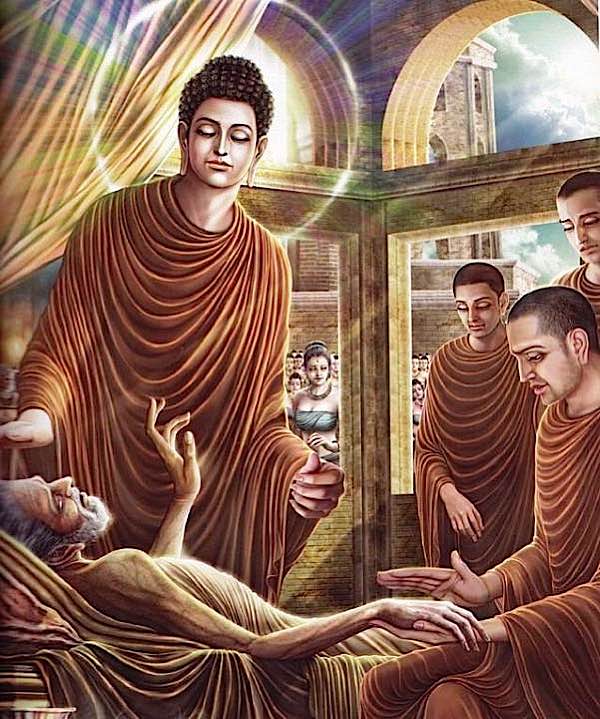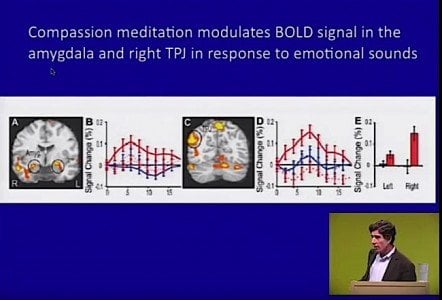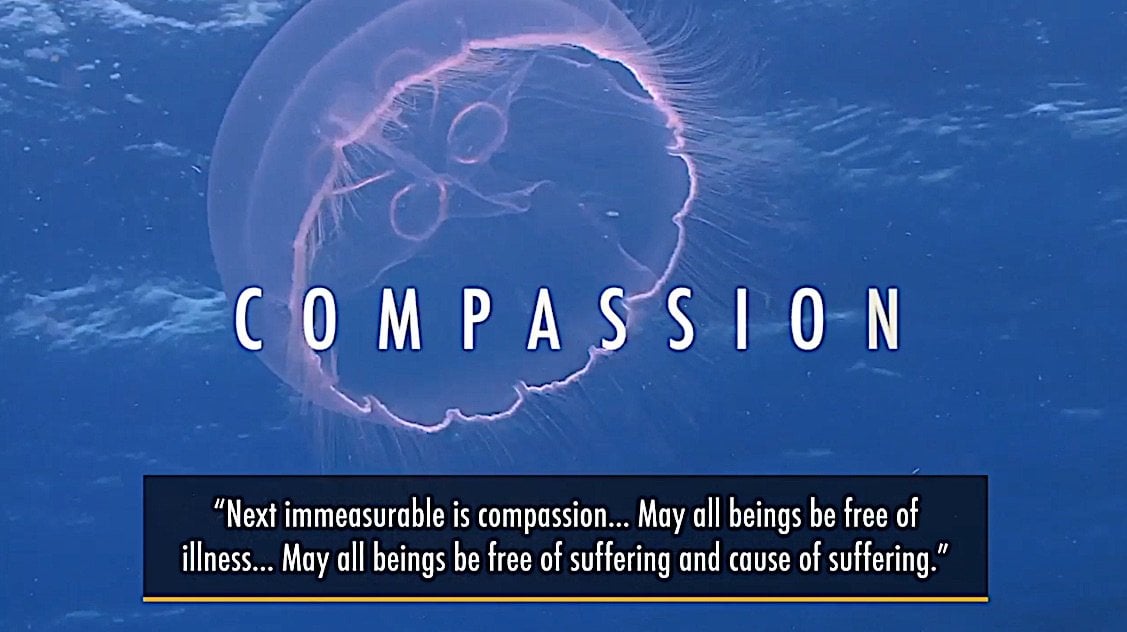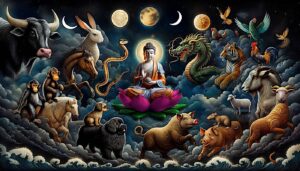Active Compassion: the core of the teachings of the Dalai Lama and Buddhism
By Payal Seth and Tanzin Dakpa
The Dalai Lama, while teaching in Bodh Gaya, Bihar, felt a sudden bout of severe pain in his abdomen. During the drive to the nearest hospital (two hours away), he saw a poverty-stricken child with no shoes, a sick disheveled old man lying on the floor, among many such others. All along the drive, he was thinking about their suffering. Upon reaching the hospital he had completely forgotten about his pain. This is the power of compassion- it even works at the physical level. He admits that his compassion for others ultimately benefitted him.
The strength of the Dalai Lama’s teaching on compassion is that they are based on personal experiences, sound reasoning, and corroboration by science. Hence, its truth becomes apparent to the practitioner as we pursue and test it.

What is Compassion?
The Tibetan Book of Living and Dying defines compassion as follows:
“It is not simply a sense of sympathy or caring for the other person’s suffering, not simply a warmth of heart toward the person before you, or a sharp clarity of the recognition of their needs and pain, it is also a sustained sense and practical determination to do whatever is possible and necessary to help alleviate their suffering”.
Hence, compassion is not compassion unless it is active.
What is the Logic behind the Virtue of Compassion?
The essence of the Dalai Lama’s teachings is this: the goal of all our lives is to be happy and too much self-centered thinking takes us away from our happiness and is the source of our suffering.

Genuine concern and compassion for others’ well-being is the only true source of happiness.
But why is compassion the only source of happiness? I have enough problems of my own. Why should I be compassionate and think about others too who are suffering?
Because we are all social animals. Much like us, even a person as powerful as the Prime Minister has to rely on the help of the rest of the community. So, if we want to have a happy life, we have to develop a serious concern for the well-being of others.

Being kind to people — experiment with it
While it is difficult to explain theoretically, it is something that we can experiment with in real life. Simple exercises like being kind to people, smiling, and saying good morning (even when we don’t feel like it), will eventually lift us. Why does it work? Because even science (read the research of Richard Davidson, a neuroscientist) shows that “we are all wired to be caring and generous to others. We shrivel when are unable to interact”. Even science admits that our basic nature is to take care of each other. When our circle of care becomes restricted to only us, then our happiness becomes elusive.
Also, take a look at history. Isn’t it the case that we always admire compassionate people? Why do you think the Dalai Lama packs stadiums for his teachings? The late revered Archbishop Desmund Tutu said
“It is largely because of who he has become. A person who has a certain spiritual stature that has made him so compassionate that he cares for others even in the midst of his immense suffering of being in exile.”

Can Science Explain the Mechanism Behind it?
Dalai Lama’s teachings that compassion is ultimately for our self-interest is what science calls reciprocal altruism. When we help others, we experience a phenomenon called the helper’s high as endorphins are released in our brains, leading to a euphoric state. The warm feeling that we get from helping someone else release oxytocin, a hormone that has several health benefits including a reduction in the inflammation of our cardiovascular system. Hence, compassion for others literally makes our hearts healthy and happy.

Compassion is also contagious. Science calls it upstream reciprocity. That is, somebody who has just received help is elevated, happy and grateful and thus more likely to help someone else. Research by social scientists, Nicholas Christakis and James Fowler has found that the ripple effect created by compassion extends to our friends by two or three degrees of separation. So, the more compassionate we are, the more likely that our friends, our friends’ friends, and even our friends’ friends’ friends are more compassionate and kinder.
How Can One Cultivate Compassion in Daily Lives?
The Dalai Lama says that compassion is something that can be learned and developed, first in our circle of immediate family, and then others in recognition of shared humanity.

He says that if someone is going through a tough time, then through compassion we will come to an automatic concern for their well-being. If it’s possible, then we must extend help. Even if not, then one can always pray and wish them well. This teaching reminds me of an anecdote that he shared once. He visited former concentration camp sites in Germany and was so overwhelmingly distraught at the suffering of the people who were killed, that he prayed for the peace of the departed soul. Hence, we are never helpless when we have compassion inside our hearts. Because even if we cannot provide material help, we can always help through our thoughts and prayers.
But do prayers really work when going through daily life issues?
The Late Archbishop Desmund Tutu, in his book, The Book of Joy (with the Dalai Lama), mentioned that the source of our stress is separating ourselves from the rest of the community and losing compassion for other people. To ensure that he never loses that aspect, Desmund Tutu dealt with problems like insomnia in a practical manner. When unable to sleep, he would think about everyone who was also awake and suffering from insomnia. It reminded him that he was not alone and he prayed for their peace. This automatically lessened his distress. The beauty of compassion lies in putting it to practical use. Just try.
Making a transition from daily life to the broader global issues

In line with the overarching theme of compassion and in this era of climate change, the Dalai Lama also encourages us to adopt vegetarianism as a gesture of compassion for the animals and the planet we inhabit. True to his reasoning, it is estimated that non-vegetarian diets have 59% more emissions than their vegetarian counterparts.[1] Finally, in line with the logic behind being compassionate, research has also supported that people living a vegetarian lifestyle are happier than their non-vegetarian counterparts.[2]

We conclude with a humorous and succinct teaching of Dalai Lama:
“If you are truly selfish, then be compassionate. Taking of others, and helping others, ultimately is the way to discover your own joy and have a happy life. I call this wise selfishness. This is the opposite of foolish selfishness, which is only thinking of oneself, bullying and exploiting others.”
Hence, be wisely selfish, be compassionate.
Compassion — the wish-fulfilling jewel
Compassion is truly said to be the wish-fulfilling jewel because it is only when we are compassionate towards others that our wish of leading a happy and peaceful life gets fulfilled. Finally, the readers can read the beautiful Tibetan prayer to cultivate more compassion in their lives:
As for suffering, I do not wish even the slightest,
As for happiness, I am never satisfied
In this, there is no difference between others and me.
Bless me so I may take joy in others’ happiness
References
- The Book of Joy by The Dalai Lama and Archbishop Tutu
- The Art of Happiness at Work by The Dalai Lama and Howard C. Cutler
Author Profiles
Payal Seth is an economist researcher at Tata-Cornell Institute, Cornell University, New York, USA. Tenzin Dakpa is a businessman in London, UK. He was formerly a Buddhist monk.
Sources and Notes
[1] No vegetarian diets associated with higher greenhouse gas emissions>>
More articles by this author
Search
Latest Features
Please support the "Spread the Dharma" mission as one of our heroic Dharma Supporting Members, or with a one-time donation.
Please Help Support the “Spread the Dharma” Mission!

Be a part of the noble mission as a supporting member or a patron, or a volunteer contributor of content.
The power of Dharma to help sentient beings, in part, lies in ensuring access to Buddha’s precious Dharma — the mission of Buddha Weekly. We can’t do it without you!
A non-profit association since 2007, Buddha Weekly published many feature articles, videos, and, podcasts. Please consider supporting the mission to preserve and “Spread the Dharma." Your support as either a patron or a supporting member helps defray the high costs of producing quality Dharma content. Thank you! Learn more here, or become one of our super karma heroes on Patreon.
Payal Seth Tenzin Dakpa
Author | Buddha Weekly
Payal Seth is an economist researcher at Tata-Cornell Institute, Cornell University, New York, USA. Tenzin Dakpa is a businessman in London, UK. He was formerly a Buddhist monk. You can read some of their previous features here>>
















